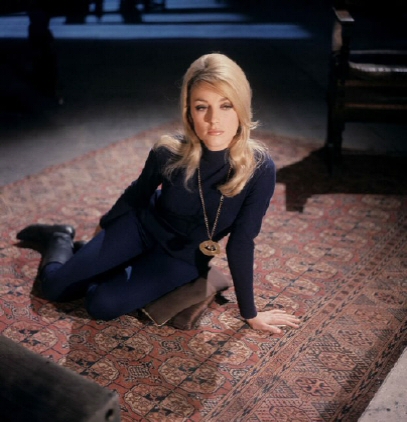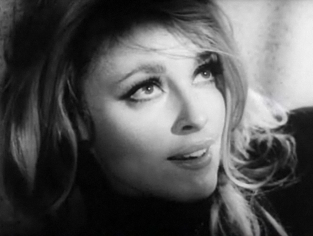
SHARON TATE: EYE OF THE DEVIL
page 2
John Cribbs
 In her role as tormentor, Tate is everything Kerr's uppity matron isn't: she prowls the grounds like a huntress and encourages Kerr's children to balance on one foot at the top of the castle’s parapet. Her carefree attitude, along with her youth and natural beauty, threatens Kerr's position the way a hip stepmom might show up an older, stricter biological one. When the rain does come (and briefly, as Odile predicted) Tate allows it to fall upon her, her long blonde hair (in contrast to Kerr's tightly wound bun) to become damp and disheveled. Her casual manner so unbecoming of a member of an upper class family draws in Kerr's kids – a boy and girl, potential prototypes for a new generation set of dove-killing siblings – and antagonizes her demure sensibility. The danger coming from Tate's insouciant Odile is made tangible in a tense moment where Hemmings casually aims an arrow at Kerr's retreating back, but it's Tate's subtle taunting that emits the real threat to Kerr and her connection to her family.
In her role as tormentor, Tate is everything Kerr's uppity matron isn't: she prowls the grounds like a huntress and encourages Kerr's children to balance on one foot at the top of the castle’s parapet. Her carefree attitude, along with her youth and natural beauty, threatens Kerr's position the way a hip stepmom might show up an older, stricter biological one. When the rain does come (and briefly, as Odile predicted) Tate allows it to fall upon her, her long blonde hair (in contrast to Kerr's tightly wound bun) to become damp and disheveled. Her casual manner so unbecoming of a member of an upper class family draws in Kerr's kids – a boy and girl, potential prototypes for a new generation set of dove-killing siblings – and antagonizes her demure sensibility. The danger coming from Tate's insouciant Odile is made tangible in a tense moment where Hemmings casually aims an arrow at Kerr's retreating back, but it's Tate's subtle taunting that emits the real threat to Kerr and her connection to her family.
In her second scene, Tate is confronted by Kerr at the top of the tower and warned to steer clear of the kids. Tate takes the opportunity to berate Kerr's trust in her husband and humiliate her faith in family values, all in a seductive monotone. Tate's insistence that she and her brother were never looked after so stringently as children and that men in general shouldn’t be trusted ("personally I have no use for them except Christian") suggests a life free of responsibility where danger, free sexuality/incest and the possibility of death is a more natural existence than the forced structure of family life. She hypnotizes Kerr with the stone medallion around her neck (personally I thought this a huge missed opportunity on Thompson’s part: Tate’s reflective eyes and soft lull are completely hypnotizing by themselves. If anything, panning down to the amulet pulls us out of the witchy reverie. But it's important to the plot later on so I'll let it slide) and guides her to the edge of the tower. Unable to stop herself from walking towards her destruction, Kerr begs Tate to help her. "I AM helping you, Catherine I am helping you " Tate insists, exemplifying once again the seduction of death – an escape from obligation and responsibility – that seems such a natural cessation to the people of Bellenec. On the surface it's a masterful suspense scene (Kerr snaps out of it just. in. TIME!), but Tate's performance takes it further.
As punishment for trying to kill his wife, Niven chases Tate across the floor whipping her with a lash, a scene that gets a lot of play in the film’s preview. She relishes the torture and ridicules his impotent attempts to cause her pain, taunting him with the accusation "You're mad but you know that, don't you?" The film is a clear inspiration for 1973's The Wicker Man, but its reversal of the victim's acceptance of his fate makes for a more interesting angle: rather than be a hapless target, Niven's character in Eye is torn by his own duty to offer himself up as a sacrifice. Niven's performance, driven by brooding and self-pity, suggests a strong subtext of seigniorial obligation as suicidal impulse. If so the self-destructive tendencies are personified by Tate's Odile: leading the children to the edge of the castle and almost sending Kerr walking off it, her exotic beauty and anesthetizing voice make death seem romantic. Tate's counterpart in Wicker Man would be Britt Ekland, who uses her sexuality to torment Edward Woodward's uptight virgin, but Tate's influence is deadlier: she symbolizes a basic human susceptibility to self-destruction. The last shot of the film is Tate, drenched in rain, watching over her next victim.
Eye of the Devil (confusingly, the movie is also known as 13...even more confusingly, Sharon only had six starring roles, but she also appeared two years later in a film called 12+1 with Orson Welles and Vittorio De Sica – unlucky for some...) allows Tate about fifteen minutes of screen time and just over a dozen lines, but in an above-average supernatural thriller of its time featuring a stellar cast and excellent direction she is unequivocally the highlight. Even Hemmings with his bow and arrow doesn't come off quite as menacing as Tate, grinning provocatively at her prey. More than threatening to seduce Nivens away from Kerr in the tradition way, she's the carefree siren that Kerr could never be – all Kerr can do is struggle helplessly to save her husband, ultimately failing against a more powerful force. There's no compromise like the one in Rosemary's Baby: the wife finds herself powerless to stop the progress of generational responsibility.
Devil's plot has more than a few similarities to Polanski's film: the wife tormented by a coven, questionable narcotics administered to her by a shady doctor, the friend who does research and advises caution, the imagined conspiracy against a single person that turns out to be real (note: Devil was filmed before Rosemary's Baby but released afterwards). Kerr's Catherine even sounds like Farrow's Rosemary, but isn't quite as sympathetic: she's too high society and humorless to relate to, it would be like feeling sorry for a bedeviled Camilla Parker-Bowles (although by the end her mounted torment and defiant – albeit late – resolve to action make her somewhat more endearing). Note to screenwriters: if you want to gain sympathy for your character it may be a good idea not to introduce her ordering her butler around (or better yet make them friends with the butler, a'la Sullivan's Travels). And anyone who's seen Repulsion will note the visual likeness to Polanski's first English film, with Tate the clear stand-in for tall blonde Deneuve. (Tate's next film, of course, would be Polanski's The Fearless Vampire Killers).

I realize I'm harping a lot on Tate's presence rather than her performance, and indeed she was often criticized for letting her looks do the acting. I'm not entirely convinced this is true: although her short filmography was filled out by a trashy melodrama (Valley of the Dolls), a Tony Curtis surf movie (Don't Make Waves) and a sexy French comedy where her voice was dubbed (12 + 1) her choices didn't necessarily reflect an unwillingness to act. It's true that Sharon admitted she couldn't "do Shakespeare" and frankly it's a good thing that Polanski wasn't able to cast her as Rosemary – she wasn't right for the part – but comparing her wicked and fun portrayal of a villain in Eye of the Devil to her comic role in Fearless Vampire Killers is enough to convince me that she had range beyond her inherent sensuality. Interestingly, Polanski did do Shakespeare – and in a scene darkly reminiscent of his wife's murder made the assault and slaughter of Macduff's family in his 1971 adaptation particularly hard to watch.
Although she came to represent the young rising actress whose career was cut short by a tragic crime, Sharon Tate was the victim of a senseless act of random violence perpetrated by a group of misguided kids. * They were led to the house and told to "kill everyone inside," knowing nothing about the occupants beyond their being "some movie stars." It's a terrifying scenario: moreso than ever before to me now that my wife and I are expecting our first kid. But almost as disgusting was the media response to her death: newspapers actually published stills from Eye of the Devil claiming that they were photos of Tate at a real Satanic gathering**. The incredible shame there is that by all accounts Sharon's attitude never corresponded to the bleak outlook of Thompson's film: she's remembered as being always effervescent and full of life, positively affecting those around her. Unlike some of the other actresses whose films I'll be watching this week, hers was not a case of murder by someone who coveted her beauty, resented her fame or sought to dominate her larger-than-life persona. It was just cruel fate, extinguishing a young woman, according to the All Eyes on Sharon Tate featurette, "bursting with youth, beauty, vitality and hope."
"Could she do it?" Thompson asked in the documentary. "That was in all our minds. We even agreed that if after a first two weeks, Sharon was not quite making it, that we would put her back in cold storage. We started work. The moment that Sharon appeared on screen in her first rushes, we knew that this wonderful personality was going to make out. We all realized that here was a girl who was tremendously exciting. She had that thing that you can't really explain, Star projection. I think this girl is going to be a big, big star "
- john cribbs, August 9, 2009
* Susan Atkins, one of the four sentenced to death for the murders (commuted to life after the death penalty was briefly abolished in California), has terminal brain cancer which has left her paralyzed in 85% of her body and with only one leg. She's been seeking compassionate release since her diagnosis in 2002, Bugliosi himself has said he's not opposed to her parole under the circumstances at this point. Her next parole hearing is at the beginning of September.***
** When the narrator of All Eyes on Sharon Tate talks about "the value of publicity", how "Sharon learns that being a movie star means been written about, talked about" it's hard not to wince.
***Another Manson curio for those interested: Squeaky Fromme is being released from prison on August 16, just thirty-four years shy of her assassination "attempt" on Gerald Ford.
<<Previous Page 1 2 Next Page>>
home about contact us featured writings years in review film productions
All rights reserved The Pink Smoke © 2009